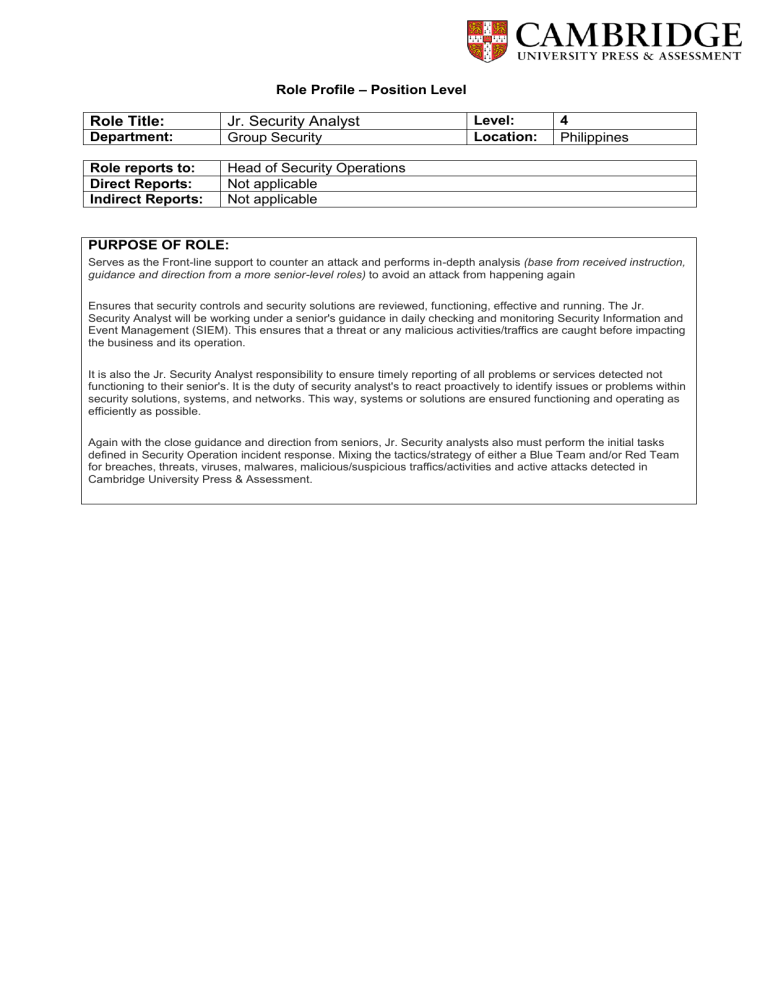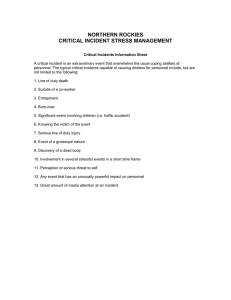
Role Profile – Position Level Role Title: Jr. Security Analyst Department: Group Security Role reports to: Direct Reports: Indirect Reports: Head of Security Operations Not applicable Not applicable Level: Location: 4 Philippines PURPOSE OF ROLE: Serves as the Front-line support to counter an attack and performs in-depth analysis (base from received instruction, guidance and direction from a more senior-level roles) to avoid an attack from happening again Ensures that security controls and security solutions are reviewed, functioning, effective and running. The Jr. Security Analyst will be working under a senior's guidance in daily checking and monitoring Security Information and Event Management (SIEM). This ensures that a threat or any malicious activities/traffics are caught before impacting the business and its operation. It is also the Jr. Security Analyst responsibility to ensure timely reporting of all problems or services detected not functioning to their senior's. It is the duty of security analyst's to react proactively to identify issues or problems within security solutions, systems, and networks. This way, systems or solutions are ensured functioning and operating as efficiently as possible. Again with the close guidance and direction from seniors, Jr. Security analysts also must perform the initial tasks defined in Security Operation incident response. Mixing the tactics/strategy of either a Blue Team and/or Red Team for breaches, threats, viruses, malwares, malicious/suspicious traffics/activities and active attacks detected in Cambridge University Press & Assessment. KEY ACCOUNTABILITIES: Operation daily routine assignments: o Performs daily log monitoring, detection of abnormal activities, and threat hunting (Proactive mode) to ensure 24/7 protection to the business. o Performs daily checking of Security operation tickets queue to ensure timely response to requests and incidents while maintaining the quality of service. Also uses existing procedures to solve routine or standard requests/incidents. o Follows Incident Response (reactive mode) procedures, i.e. response to security alerts from SOC Global monitoring tools, malware attack, virus escalation, DDOS, the discovery of Data theft, etc., to ensure support efficiency and effectiveness. o Provides L2 support for Security Operation Services (with guidance and direction from senior's) before escalating to L3 (refer to SOC Service Catalogue) to ensure that an incident is timely escalated when needed. o Performs timeline and information note-taking during M1 and P1 incidents to ensure that all details needed in completing the Security Incident report are documented. o Assists his senior colleagues when needed for any security-related activities i.e audits, risk assessments and others. o Helps in documenting and updating operational processes and procedures to ensure that it is up to date and is still applicable to the business. KEY RELATIONSHIPS (INTERNAL AND EXTERNAL): Maintains relationships and provides regular updates to Senior Security Analysts and Head of Security Operation Works closely with Security Analysts, Sr. Security Analysts, Technology Operation Team and inter-departmentally Maintains relationships with the broader University on incident response, technical threat identification and mitigation strategies. Maintains relationships with both domestic and international authorities. AUTHORITY LEVEL (PEOPLE, POLICY, FINANCIAL): Not applicable ESSENTIAL KNOWLEDGE / SKILLS Basic knowledge/idea in Ethical hacking, Intrusion Prevention, Incident Response, Computer Forensics, Reverse Engineering from tertiary school Training completion and Certification of Security Blue Team Level 1 (provided by Cambridge) Completion of Learning Paths in TryHackMe program (provided by Cambridge) ESSENTIAL QUALIFICATION(S), EXPERIENCE AND REGISTRATION A minimum of 0-1 year of work experience in Information Technology or Customer IT Technical support industries Typically requires a college or university degree or the equivalent work experience and has conceptual knowledge of fundamental theories, principles and practices Basic Networking knowledge, i.e. OSI Layer Has some basic knowledge or understanding of some information security technologies, including Firewalls, IDS/IPS, DLP, End Point Security, Data Encryption, Network Access Control, Web/Email filtering, Penetration Testing, Forensic Investigation and Security Incident and Event Management is an advantage Basic understanding of Information Security Management Systems and information security standards - ISO27001 & PCI-DSS is an advantage Has aspirations for CompTIA Security+, Ethical hacking (CEH) certifications Has basic knowledge and strong passion in Cyber Security Good communication skills, i.e. ability to communicate with technical and non-technical audiences at various levels, is a must A good level of written English for the development and delivery of reports and technical documentation is a must Keen to learn and has strong motivational skills Willingness to work in extended hours when needed, especially during MI or P1 security incidents Ability to works in shifting schedule for 24x7 security coverage Knows how to handle pressure or stress KEY COMPETENCIES (ORGANISATIONAL VALUES): • • • • • Achieving: being responsive, decisive and accountable to further our mission Inspiring: role models optimism, motivation and authenticity Inclusive: curious, open-minded, and ready to learn from others Trusted and trusting: enables individuals, teams and organisations to collaborate with integrity Confidence with humility: has confidence in her/his abilities, with the willingness to learn and adapt KEY COMPETENCIES (LEADERSHIP): KEY COMPETENCIES (FUNCTIONAL): Being responsive, optimism, curious, open-minded, ready/willing to learn, collaborative, confident CONTEXT OF THE ROLE: Other Technology teams will remain responsible for the delivery of secure applications, networks and infrastructure in compliance with Information Security Policies

